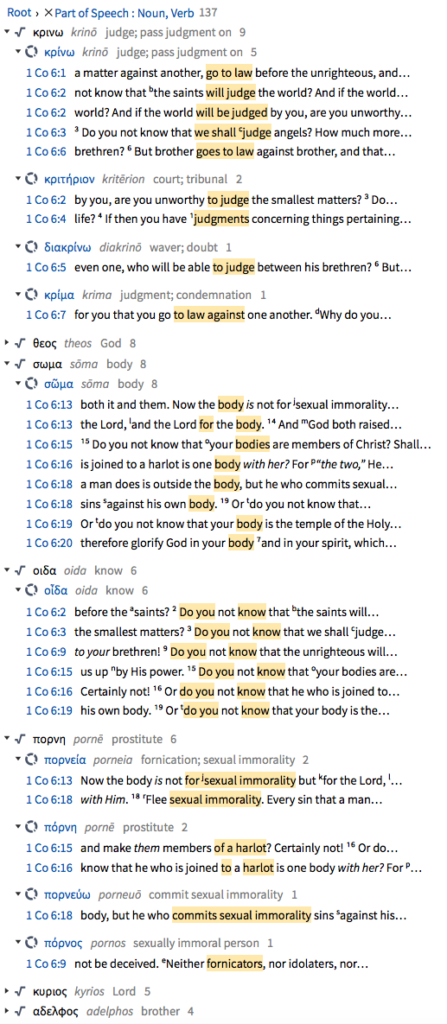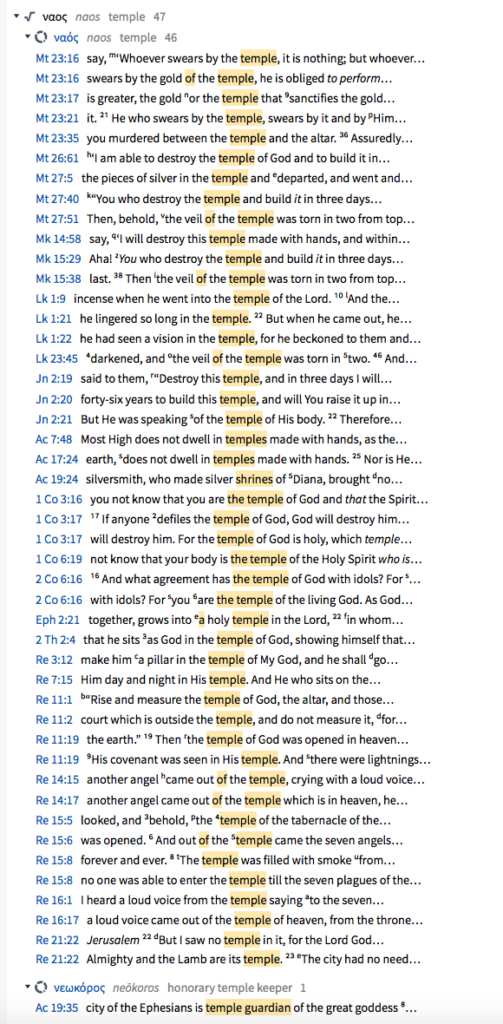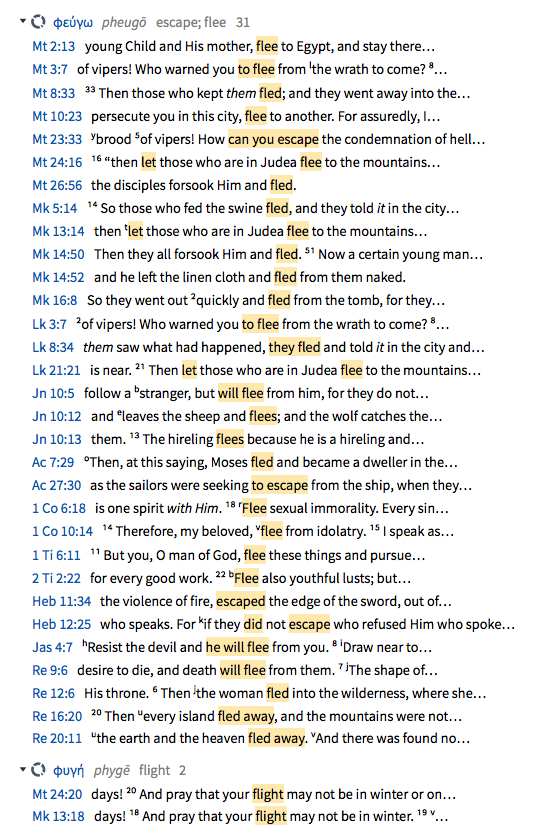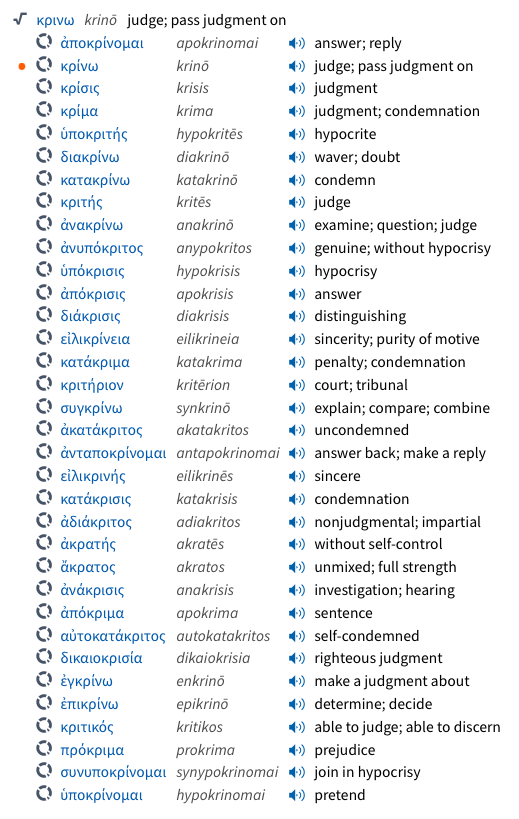As posted Saturday, Nov. 4, 2017
Updated 11/7/17 with Para. 9
Ch 6 resources are below:
- PDF of Ch 6 in interlinear format showing the Gr. “root” of each word, and the Strongs Number (remember that you have to put a “G” before the number when doing any inline search to distinguish it from the OT, Hebrew number, which would be preceded by an “H”). The PDF is 1 Cor 6, NKJV, Root, Strongs:
- The most frequently occurring nouns and verbs in 1 Cor 6 are given in the pasted-in chart in Sub Para B, below.
- The words for God (8x), LORD (5x), and Spirit (4x; not shown below) dominate Ch 6. But, surprisingly, the root word for judge, krino occurs 9x in this short chapter. Also important is the one particular word for “know” that we studied earlier, oida or eida (8x), and continuing the theme in Ch 5 the word porne is important (6x). A new important word occurs here in Ch 6, namely body (Gr. soma), occurring 8x in Ch 6.
- Table of Ch 6 word frequency (nouns and verbs only) is shown below:

- What’s going on here with the repeated use of the root word krino (judge) here in Ch 6 and as we also saw in Ch 5? And how does this fit with the admonition we saw in Ch 4 not to judge?
- Regarding the also frequent occurrence of the root word for know, what is the connection with the use of the word judge?
- Note the extended teaching about the root word porne.
- In Ch 5 this root word was used in the context of the behavior of one person and the “puffed up” (pride) of the rest apparently about the perceived Christian liberty about that particular behavior and, likely (based on the metaphorical use of the word yeast) extending all manner of licentious practice.
- Here in Ch 6 there is an extended teaching about the significance of such and related sin. How important is it to note that porne is frequently connected with idolatry in the OT?
- The Gr. soma (body) is a word subject to much discussion, in particular how it relates to other Gr. words relating to a human being: soul (psyche), flesh (sarx), spirit (pneuma), mind (nous), heart (kardia), etc.
- A PDF from a respected lexicon for the word soma is Gr soma G4983: In the context of Ch 6, how are we to understand body?
- Think about boundaries and (thereby) distinctions. What defines me? One can answer this question in many ways. In what way does body (soma) define me, and what difference does it make here in Ch 6?
- The Gr. word naos (temple) occurring here in Ch 6 is especially significant (see 6:19).
- PDF from a lexicon is Naos, Temple, Strongs G3485:
- The word naos occurs 47x in the NT, 46x of those times as a noun, describing a location. See below: Note that the word occurs 6x in the two Corinthian Epistles, and only two other times in all the other Epistles combined. Why might the use of the word naos in the Galatian Epistle been especially prone to confusion and misuse? (Here’s a real sidebar discussion: modern skeptics use word analysis to raise doubts about authorship. When a particular word occurs frequently in one book, i.e. some particular Epistle, and not in others which are claimed to be written by the same author (e.g., Paul), the argument goes that such suggests that such book is written by a different author. However, we understand that the Holy Spirit is the author of all of Scripture and He has used those words which were most appropriate for the context of the expression of the issues in any particular embodiment).

- Think about how/where else naos occurs. How significant is it that this text refers to the naos being in me? How is this related, then, to porneia?
- How then does naos relate to the answer to the universal question we all ask (or should ask) of our ourselves of “Who am I, really?.”
- How does naos relate to the idea of “the universal priesthood of nelievers?”
- What is the significance of naos in terms of eschatology (future times)? (Consider the many occurrences of naos in the Book of Revelation in the above pasted-in chart).
- In our culture there is a ongoing discussion about “fight or flight” inclinations or behaviors. One term for this is “hyperarousal” for the acute stress response; anyone that’s been married for a while knows both responses well. We don’t usually think of such issue as relevant to the Christian life. But consider 6:18, where flee (pheugo, G5343) is emphatically stated: it’s the first Gr word in the sentence, which is the emphatic position and it is a verb in the imperative mood, meaning a command. But why flee instead of fight, or resist?
- The Gr word pheugo occurs 46x in the NT, as shown in the two paste-in charts below:


- How might one summarize the ‘doctrine’ of fleeing?
- We typically associate fleeting with cowardice. But is that a proper universal association?
- Aristotle here has a useful insight. Recall his methodology typically analyzes two extremes to find that “wisdom” is at some point of a golden mean between them. One extreme here would be a person who always, automatically flees, and the other always, no matter what, charges into battle. Aristotle would say that both such persons are unwise, even the one that appears to be “highly courageous,” as there can be a small, or no, difference between highly courageous and foolhardy, even downright crazy-stupid.
- In Scripture we are repeatedly taught that there are circumstances, as here in Ch 6, where fleeing is the God-directed, even commanded, response.
- How might the doctrine of fleeing comport with Jesus’s reference to plucking out one’s eye in His Sermon on the Mount?
Matt. 5:27 “You have heard that it was said to those of old, ‘You shall not commit adultery.’ 28 But I say to you that whoever looks at a woman to lust for her has already committed adultery with her in his heart. 29 If your right eye causes you to sin, pluck it out and cast it from you; for it is more profitable for you that one of your members perish, than for your whole body to be cast into hell. 30 And if your right hand causes you to sin, cut it off and cast it from you; for it is more profitable for you that one of your members perish, than for your whole body to be cast into hell. NKJV
- Now, let us connect the idea of fleeing with judging (krino) and the command to exclude Ch 5. We tend to immediately connect fleeing as the proper response of the man in that sin of Ch 5, namely: he should be fleeing the temptation and the circumstance in which they are now so proud, and of course that is a correct application. But the context here suggests a different application as well: that one should flee from such brother and also from being “puffed up” about licentiousness (porneia).
- Who, by the way, is to be doing the judging in Ch 5 and here in Ch 6?
- Recall that the Corinthian Epistle is written to the saints at Corinth, meaning all of God’s children (“saints” mean those set apart by God, which does not mean, automatically, that such saints are behaving well at some particular moment or relating to some particular matter).
- There is no mention of “pastor” (either here or elsewhere in the NT), or “Bishop,” or even “the elders.” Silence is not automatically affirmative of a doctrine, but is suggestive as the text could easily have said “And the Elders among you….” Neither the word “Elder” nor “Bishop” occurs a single time in either Corinthian Epistle (and of course neither does “Pastor”). However we have other (poignant) examples of the important role of “Elders” including Acts 20 regarding Paul’s final meeting with the Elders of the church at Ephesus who had journeyed to the port city of Miletus during Paul’s final journey to Jerusalem and subsequent arrest and trial.
- And from what does such exclusion apply? Ch 5 seems to say simply not to “keep company” in the context of gathering together, especially for a fellowship meal (which as we will see later appears to be a dinner gathering on Sunday evenings). The word “member” or “membership” does not occur in Ch 5, It (“member”) does occur in Ch 12 (vs. 12, 14, 18, 19, 20, 22, 23, 25, 26, and 27), and other places in the NT. But “member” is also used of “belonging” in a very different sense, as in 6:15 where it notes that I am “the member of Christ” and, so, not to be “member of a harlot.” (“Membership” never occurs in the Bible, at least in the NKJV).
- The Gr word pheugo occurs 46x in the NT, as shown in the two paste-in charts below:
- More on Judging (krino). Krino is the “root” of many different words, more than 20 in the NT, all relating in some way to judging. They are shown in the chart below. (If anyone claims that the Bible teaches “do not judge,” you might, gently, point our that in the NT alone it talks about “judging” 583 times). The root meaning of this root word relates to “to sunder,” i.e. “to break in two,” “to cut.” One of the principal Gr authorities writes on the definition of krino: krino The Theological Dictionary of the New Testament, Abridged in One Volume. The various NT words with the root krino is given below:

___________________________
Ch 7 resources are here: